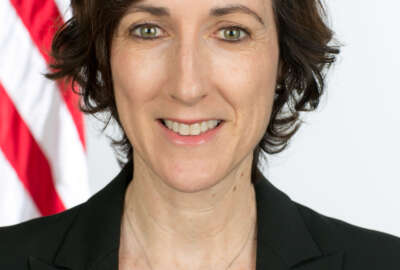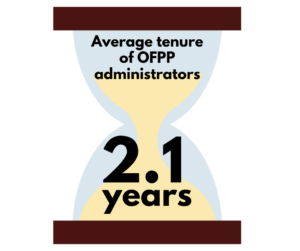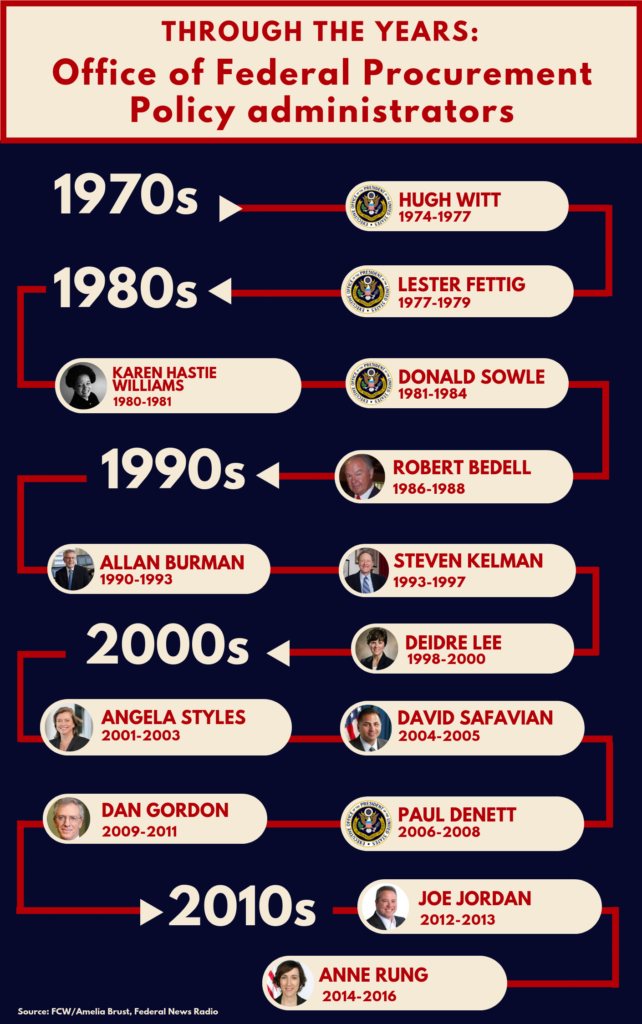 Exclusive
Exclusive OFPP administrator, where art thou?
OFPP has been without a permanent administrator for almost two years and with no nominee in sight, experts question whether having a Senate confirmed one matters...
Best listening experience is on Chrome, Firefox or Safari. Subscribe to Federal Drive’s daily audio interviews on Apple Podcasts or PodcastOne.
In about a week, the Office of Federal Procurement Policy will have been without a permanent leader for two years. That’s 720 days without a Senate confirmed, presidentially appointed executive to lead administration acquisition reform and deregulation priorities.
And Lesley Field, the deputy OFPP administrator, will become the longest serving OFPP administrator ever, racking up more than 4.25 years as acting administrator over the last 10 years.

Field, who became OFPP deputy administrator in July 2008, has been acting four times during her tenure. The first was in September 2008 when Paul Dennett stepped down, and then three more times, including since October 2016 when Anne Rung left for Amazon Business.
While Field is no longer technically acting administrator as the 210-day limit under the Federal Vacancies Act kicked in months ago, she is considered by almost everyone in the acquisition community still to be the leader of OFPP.
Meanwhile, the White House has not nominated anyone to be the OFPP administrator and it’s unclear when a candidate will emerge. Several sources confirmed four potential candidates didn’t make it through the vetting process over the last two years, and the one qualified executive that would’ve made it through the process, Emily Murphy, ended up running the General Services Administration.
“[The Office of Management and Budget]’s Deputy Director for Management Margaret Weichert was just recently confirmed in February of 2018 and is working to build out her team and find the right person to lead OFPP,” OMB spokesman Jacob Wood said in an email to Federal News Radio. “Because of the great work Lesley Field, Mathew Blum, and the OFPP team do in the absence of a Senate-confirmed OFPP administrator, it has afforded Ms. Weichert the ability to selectively search for a quality caliber candidate to help drive the procurement policies laid out in the President’s Management Agenda.”
So all of this begs several questions: Does the government even need an OFPP administrator anymore? And if not, would Congress even consider changing the position from one that is Senate confirmed to one that is just presidentially appointed?
Or if so, why can’t the administration find someone to take the position?
“I would support making OFPP administrator a career position,” said Rob Burton, a former deputy OFPP administrator and now an attorney with Crowell & Moring. “Historically political appointees don’t stay longer than about two years, and that becomes a drain on office resources to prepare for confirmation hearings and new appointees. There is an enormous amount of work going into that.”

But Burton, like other current and former acquisition executives, say while Field and the OFPP staff are among the best in government, not having a permanent OFPP administrator is problematic in specific instances.
“We are at a point in time when you could really make some significant changes to the way our federal government buys, but you have to have someone at the political level to lead that,” said Angela Styles, a former OFPP administrator during the administrator of former President George W. Bush. “You have industry, Congress, the Defense Department and really everyone understands the need to simplify the acquisition system and make it easier to access technology and commercial products and services. But there is not one person leading the effort. For at least right now, that is the most significant problem.”
This is true for many of the Trump administration’s priorities ranging from IT modernization to category management to federal spending transparency to improving the management of major acquisitions. Styles also said the Section 809 panel will be making recommendations in the coming year around acquisition reforms. The OFPP administrator normally would be leading the decision process of which reforms to implement.
While Field, Blum and others in OFPP are quite capable to lead these efforts, Styles, Burton and other experts say having a political appointee in place would make a huge difference in the success of these initiatives.
“It’s the gravitas and being in the room,” said Styles, who now is a partner with Bracewell. “Lesley and staff are incredible, but you have to have somebody who is comfortable leading in that role. Only a political appointee who is confirmed will have enough gravitas to be in the room to get the okay from OMB Director Mick Mulvaney. Otherwise, it’s hard for Lesley and OFPP staff to make decisions when leading any priority. That is why we are not really seeing anything new out of OFPP. That’s not Lesley’s job. Her job is to tend the house.”
Burton added it’s well-known and widely recognized that it’s easier to promote aggressive agenda with political appointees in OFPP because there is more of a tendency for politicals to want to deal with politicals.

At the same time, the case for not having a permanent OFPP leader any longer is getting easier to make.
A current federal acquisition official, who requested anonymity because they didn’t get permission to talk to the press, said because the acquisition community respects and admires Field and OFPP career staff so much, progress is being made.
“I think from a procurement perspective when we bring issues to her, they do get addressed. Does Lesley have the ear of all politicals? I’m not always sure,” the official said. “I’m not sure she can or is willing to escalate certain issues that may be political bombs up there. But that being said, we haven’t had anything come up in the last 15 years where the world would fall apart in procurement.”
The official said the federal acquisition system is one of the more mature areas of government so the process to change whether around the President’s Management Agenda or from new laws is well known and understood.
“Lesley has the ability to push back, but has to be more graceful and know how to push back,” the source said. “You want people sitting in the agencies to help to push back against a bad idea. A lot of us raise issues to our political leadership if they have the clout to whisper back in OMB’s ears. She has been able to slow things down and have them rethink certain things because she is well admired and successful. What I like about what we do is it’s not political so it’s easier to talk common sense and impact. There is not a lot of politics surrounding what we do so that helps us have the ability for her to have good fact-based conversation.”
But others say not having a permanent OFPP administrator is slowing down the one way to change the acquisition process: regulations. From Jan. 20 to Dec. 31, 2017 only one final rule came out under the Federal Acquisition Regulations. And this year hasn’t been much better with 52 open FAR cases as of Sept. 14 and only 12 final rules.
Without an OFPP administrator and with Weichert’s focus must be on the big picture issues, there isn’t anyone in OMB ensuring the Trump administration’s deregulation effort is moving forward.
Additionally, sources say agencies are considering deviations to the FAR instead of proposing new rules because there is little confidence that new rules would happen anytime soon.
“It’s important to have someone who can clearly define what our path for acquisition is in regards to other elements of OMB’s priorities, like IT modernization,” the federal official said. “I’m not sure if Lesley carries the clout or has ability to push the envelope. It’s not good to have someone in there with an acting title. It implies that they are not the final decision maker. But if you have to have someone, Lesley is good and the right person to have as acting.”
But nearly all the experts say having Field continuing to act is better than bringing in an under qualified or unqualified appointee. Additionally, experts say with Murphy leading GSA the administration may not be in a hurry to name a permanent OFPP administrator.
“The fact that Emily has a strong background in acquisition, is a political appointee and in a position to influence governmentwide policy, maybe there is a lot of communications between GSA and OFPP and that is filling the void,” Burton said. “The relationship between OFPP and the GSA administrator may mitigate the fact there isn’t political arm at OFPP.”
There are many who believe the lack of a permanent OFPP administrator is a symptom of a bigger problem that every administration seems to have when they take office.
“One day someone will wake up and realize that procurement is really a critical piece. They brush it off as always being late or slow or because of the FAR. But they are not thinking about the fact that we are heroes in fixing the problem. If you don’t have a good contract in place, you can’t get anything done,” the federal official said.
Read more of the Reporter’s Notebook
Copyright © 2025 Federal News Network. All rights reserved. This website is not intended for users located within the European Economic Area.
Jason Miller is executive editor of Federal News Network and directs news coverage on the people, policy and programs of the federal government.
Follow @jmillerWFED
Related Stories

Another candidate emerges for OFPP administrator; DHS, GPO lose IT execs




